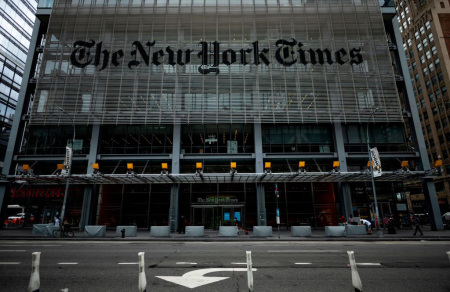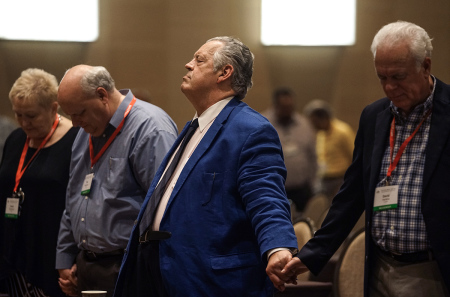PRRI survey, NY Times columnist’s view of religious right reveals ‘astounding bias’: Richard Land

A recent New York Times op-ed fundamentally misunderstands and misrepresents how conservative-leaning Christians think about the state of affairs in U.S. politics, according to Richard Land, outgoing president of Southern Evangelical Seminary.
In a July 9 op-ed by The New York Times' Michelle Goldberg, titled “The Christian Right Is in Decline, and It’s Taking America With It,” the columnist argued that the statistics show religious conservatives are in decline and, in response, they're willing to “defile” the nation if they can’t take it over.
The high point of the religious right’s influence, she mused, might prove to be the presidency of George W. Bush, particularly in 2004 when the culture generally agreed with them on the hot-button social issue of the day: same-sex marriage.
Goldberg further elaborated that the percentage of white evangelicals has dropped, citing research from the Public Religion Research Institute that showed white mainline Protestants outnumbered white evangelicals in 2020.
Her assertion that conservative Christians are animated by a triumphalist ethos and want to take over American culture is completely wrongheaded, said Land, who also serves as the executive editor of The Christian Post, in an interview on Monday.
“Nothing could be further from the truth,” Land said of Goldberg’s contention, noting that among spiritual and religious leaders, the thinking among Christian conservatives who started becoming more visibly involved in politics several decades ago was far from triumphalist. Rather, their posture was wholly defensive.
“We didn’t begin this culture war. Politics is downstream from culture, and culture is downstream from religion, or alternatively, your worldview. Progressives are bringing their worldview, which is their religion, into culture and into politics. Evangelicals are doing the same thing,” he said.

“Virtually every religious leader that I knew, and know, that was involved understood that our efforts were attempts to fight a strategic retreat, to minimize the damage to our culture until and when a great spiritual revival awakening came to the country. And that without it, America was going to be a very different place.”
Goldberg’s op-ed is the perfect example of a “wish being the father of the thought,” he asserted.
Land considers the recent PRRI study an outlier, adding that the active practice of Christian faith declining in the U.S. is not news to evangelicals. While no religious group is growing as fast as the population, the only two that have shown actual growth over the past decade are white evangelicals and the historic black church, he said.
“Any research or assertion that mainline Protestantism, which has virtually disappeared before our eyes in my lifetime, has overtaken evangelicals in terms of a percentage of the population is research that has moved to an alternative universe. It has no relation to actual facts on the ground,” Land said.
He added that by any standard of measure, he would be the epitome of the “religious right,” and he had to research what QAnon was when he first heard about it in the news.
Goldberg’s opinion piece also asserted that borne out of the belief that evangelicals no longer own mainstream culture and its moral values and they are now “just another subculture,” much of the current cultural conflict that has arisen “helps explain not just the rise of Donald Trump, but also the growth of QAnon and even the escalating conflagration over critical race theory.”
This, again, fundamentally misunderstands the facts on the ground, Land said. “The idea that QAnon is deeply embedded in the religious right reveals an astounding bias,” he said.
“I have a very low expectation of the editorial page of the New York Times, but Ms. Goldberg’s op-ed reached new lows of propaganda masquerading as opinion.”
The outgoing seminary president emphasized that the salvation of the U.S. will not come from the nation’s capital city.
“If America is going to be revived, it’s going to be one person, one family, one church at a time. Government is not a locomotive. It’s a caboose. When the people change, the government will change, not Washington to the people. The salt of the law can change actions, behaviors and habits. It’s only the light of the Gospel that can change attitudes, beliefs and hearts,” he added.
Send news tips to: brandon.showalter@christianpost.com Listen to Brandon Showalter's Life in the Kingdom podcast at The Christian Post and edifi app Follow Brandon Showalter on Facebook: BrandonMarkShowalter Follow on Twitter: @BrandonMShow





















